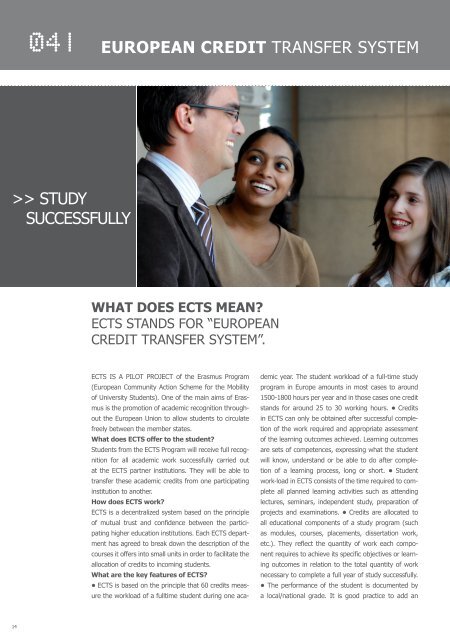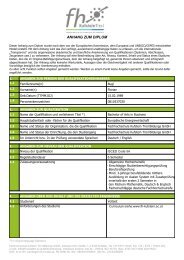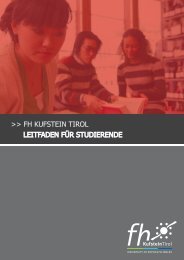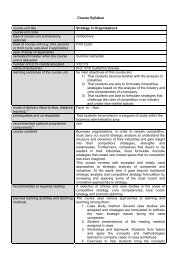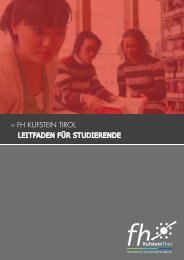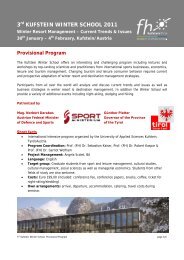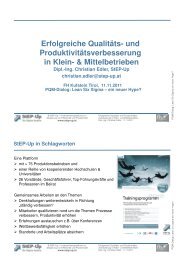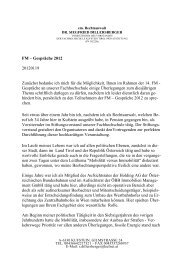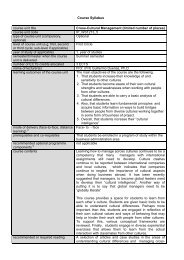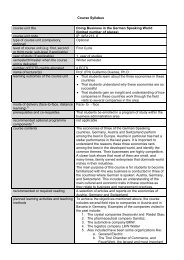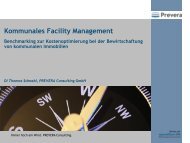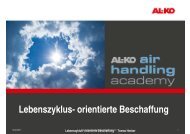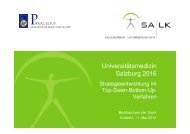ECTS GUIDE FH KUFSTEIN TIROL
ECTS GUIDE FH KUFSTEIN TIROL
ECTS GUIDE FH KUFSTEIN TIROL
You also want an ePaper? Increase the reach of your titles
YUMPU automatically turns print PDFs into web optimized ePapers that Google loves.
EUROPEAN CREDIT TRANSFER SYSTEM<br />
>> STUDY<br />
SUCCESSFULLY<br />
WHAT DOES <strong>ECTS</strong> MEAN<br />
<strong>ECTS</strong> STANDS FOR “EUROPEAN<br />
CREDIT TRANSFER SYSTEM”.<br />
<strong>ECTS</strong> IS A PILOT PROJECT of the Erasmus Program<br />
(European Community Action Scheme for the Mobility<br />
of University Students). One of the main aims of Erasmus<br />
is the promotion of academic recognition throughout<br />
the European Union to allow students to circulate<br />
freely between the member states.<br />
What does <strong>ECTS</strong> offer to the student<br />
Students from the <strong>ECTS</strong> Program will receive full recognition<br />
for all academic work successfully carried out<br />
at the <strong>ECTS</strong> partner institutions. They will be able to<br />
transfer these academic credits from one participating<br />
institution to another.<br />
How does <strong>ECTS</strong> work<br />
<strong>ECTS</strong> is a decentralized system based on the principle<br />
of mutual trust and confidence between the participating<br />
higher education institutions. Each <strong>ECTS</strong> department<br />
has agreed to break down the description of the<br />
courses it offers into small units in order to facilitate the<br />
allocation of credits to incoming students.<br />
What are the key features of <strong>ECTS</strong><br />
• <strong>ECTS</strong> is based on the principle that 60 credits measure<br />
the workload of a fulltime student during one academic<br />
year. The student workload of a full-time study<br />
program in Europe amounts in most cases to around<br />
1500-1800 hours per year and in those cases one credit<br />
stands for around 25 to 30 working hours. • Credits<br />
in <strong>ECTS</strong> can only be obtained after successful completion<br />
of the work required and appropriate assessment<br />
of the learning outcomes achieved. Learning outcomes<br />
are sets of competences, expressing what the student<br />
will know, understand or be able to do after completion<br />
of a learning process, long or short. • Student<br />
work-load in <strong>ECTS</strong> consists of the time required to complete<br />
all planned learning activities such as attending<br />
lectures, seminars, independent study, preparation of<br />
projects and examinations. • Credits are allocated to<br />
all educational components of a study program (such<br />
as modules, courses, placements, dissertation work,<br />
etc.). They reflect the quantity of work each component<br />
requires to achieve its specific objectives or learning<br />
outcomes in relation to the total quantity of work<br />
necessary to complete a full year of study successfully.<br />
• The performance of the student is documented by<br />
a local/national grade. It is good practice to add an<br />
<strong>ECTS</strong> grade, in particular in case of credit transfer. The<br />
<strong>ECTS</strong> grading scale ranks the students on a statistical<br />
basis. Therefore, statistical data on student performance<br />
is a prerequisite for applying the <strong>ECTS</strong> grading system.<br />
Grades are assigned among students with a pass grade<br />
as follows:<br />
EXPLANATION TO TRANSCRIPT OF RECORDS<br />
Grading Scale Fachhochschule Kufstein<br />
Grade Definition Performance<br />
1 very good 100 - 90%<br />
2 good 89 - 80%<br />
3 satisfactory 79 - 70%<br />
4 sufficient 69 - 60%<br />
5 fail 59 - 0%<br />
A distinction is made between the grades FX and F that<br />
are used for unsuccessful students. FX means: “fail -<br />
some more work required for passing” and F means:<br />
“fail - considerable further work required”. The inclusion<br />
of failure rates in the Transcript of Records is optional.<br />
What are the key documents of <strong>ECTS</strong><br />
• The regular Information Package / Course Catalogue<br />
of the host institution is to be published in the local/<br />
national language and in English (or only in English for<br />
programs taught in English) on the Web and/or in hard<br />
copy in one or more booklets. The Information Package<br />
/ Course Catalogue must contain the items of the<br />
checklist including information for visiting students from<br />
abroad. • The Learning Agreement contains the list of<br />
courses to be taken with the <strong>ECTS</strong> credits which will<br />
be awarded for each course. This list must be agreed<br />
by the student and the responsible academic body of<br />
the home institution. In the case of credit transfer, the<br />
Learning Agreement has to be agreed by the student<br />
and the two institutions concerned before the student’s<br />
departure and updated immediately when changes occur.<br />
• The Transcript of Records documents the performance<br />
of a student by showing the list of courses<br />
taken, the <strong>ECTS</strong> credits gained, local or national credits,<br />
if any, local grades and possibly <strong>ECTS</strong> grades awarded.<br />
In the case of credit transfer, the Transcript of Records<br />
has to be issued by the home institution for outgoing<br />
students before departure and by the host institution<br />
for incoming students at the end of their period of study.<br />
More information on <strong>ECTS</strong> can be found under:<br />
http://europa.eu.int/comm/education/<br />
programmes/socrates/ects/index_en.html<br />
What is the Diploma Supplement (DS)<br />
The Diploma Supplement is a document attached to a<br />
higher education diploma providing a standardized description<br />
of the nature, level, context, content and status<br />
of the studies that were successfully completed by the<br />
graduate. The Diploma Supplement provides transparency<br />
and facilitates academic and professional recognition<br />
of qualifications (diplomas, degrees, certificates).<br />
For more information on the DS please see the<br />
following website: http://europa.eu.int /comm/<br />
education/policies/rec_qual/recognition/<br />
diploma_en.html<br />
LANGUAGE COURSES<br />
Whereas most of the regular courses held at <strong>FH</strong> Kufstein<br />
are taught in German, the courses of the International<br />
Program are all held in English. International students<br />
have the possibility to take German language courses as<br />
part of their academic program.<br />
As the <strong>FH</strong> Kufstein puts an emphasis on internationality,<br />
several other languages are taught as well and are<br />
offered at low cost by a special program called Michelangelo.<br />
Students may choose English, Spanish, Italian,<br />
French, Chinese, Arabian, and others.<br />
For further information, please contact<br />
michelangelo@fh-kufstein.ac.at.<br />
„<br />
14 15


